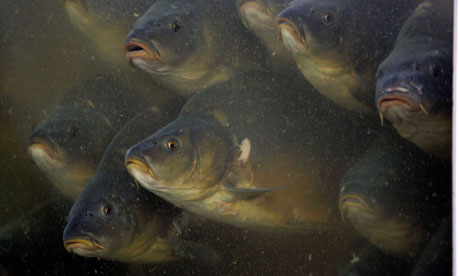The world needs to farm more fish and algae to meet the world's growing demand for animal products, according to a report released on Tuesday by international NGO Conservation International.
The worldwide assessment concluded the environmental impact of aquaculture is lower than raising cattle, pigs or poultry so it should be expanded to alleviate the growing global food crisis.
"Aquaculture is most likely to meet the growing demand for animal products with the least demand on ecosystems," said Sebastian Troëng of Conservation International. "It would be better still if more people became vegetarian, but that looks unlikely."
The report was co-written with the WorldFish Centre – which advocates sustainable aquaculture – as a response to the precipitous decline in word fish stocks.
The United Nations Food and Agriculture Organisation estimates that over 84% of the world's fisheries are either depleted, over- or fully exploited, which means that wild fish in oceans are too weak to meet the growing needs of an expanding, increasingly affluent global population.
Fish farming in ponds, lakes, rivers and coastal waters is increasingly used to fill the gap – it is overtake wild-caught fish produce this year – particularly in Asia. The world's most crowded continent accounts for 91% of aquacultural production with the vast majority – about two-thirds – in China. This trend is expected to continue.
"China, India and the rest of Asia with their growing middle classes are where we can expect demand for fish to rise most significantly," said co-author Mike Phillips, a senior scientist at WorldFish. "Current trends indicate that the majority of the increase in global production will come from south and south-east Asia, with a continued drive by major producersuch as China and Vietnam towards export to Europea and north America."
The report says fish farming can have environmental benefits if done sustainably. Fish process energy more efficiently than mammals such as cows and pigs because they are cold-blooded (so less calories are needed for warming themselves) and live in water (so relatively more of the body converts to muscle than bone). The authors say that for each kilogram of protein from beef, a cow needs to be fed the equivalent of 61kg of grain, for pork, a pig needs 38kg, but for fish it is just 13kg of grain.
In addition, says the report, aquaculture emits less phosophorous, nitrogen and greenhouse gases than livestock farms.
However, it warns farming can have a greater negative impact if it focuses on carnivorous fish such as eel and salmon, or on shrimps and prawns, which require more temperature control. There is a lower impact from herbivorous fish, or better still seaweed, mussels, oysters and molluscs.
Fish farms have also been blamed for pollution and genetic contamination of wild stocks.
The report says 73% of salmon, 90% of carp and 99% of seaweed consumed worldwide is produced with aquaculture. The authors predict worldwide production will rise from 52.6m tonnes in 2008 to between 79m and 110m tonnes by 2030. However, environmental constraints could slow growth in China due to shortages of land and water and increased competition for energy and feed.
To improve the industry, they suggest greater monitoring, technological innovation and policy support. Mass production of microalgae – which is thought to be approaching commercial stage – is thought to have enormous potential for efficiency gains because it could replace fish feed and fish oil.

